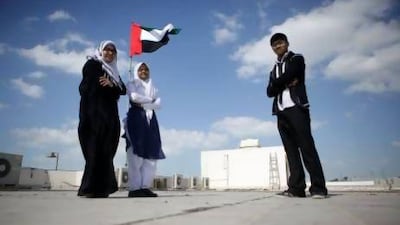ABU DHABI // It began six years ago with a school eco club, and the ultimate goal of Sheikh Khalifa Bin Zayed Bangladesh Islamia School is to be completely carbon neutral.
The next step is to install solar panels on the auditorium roof – a proposal that won the school a Zayed Future Energy Prize this week, with an award of $100,000 (Dh367,000) to help to finance it.
The school's success put Abu Dhabi among the winners at this year's awards, established five years ago by Masdar to encourage innovative conservation projects.
"Our movement towards sustainable practices started when we set up our eco club in 2007," said Mir Anisul Hasan, the school principal. "This led to making several eco-friendly decisions around campus."
Sheikh Khalifa Bin Zayed Bangladesh Islamia is a private school in Al Muroor founded by the Bangladeshi community for low and middle-income families.
It teaches thousands of children from pre-primary to Grade 12.
Last year the school replaced its 80-watt lightbulbs with 20-watt bulbs, saving 15 per cent of their energy.
The Zayed Future Energy Prize is a fund of $4 million awarded annually to finance environmental projects initiated by companies, schools and individuals around the world.
The school won in the Global High School category, introduced this year. It was given to four high schools: one each from the Americas, Europe, Africa and Asia.
Secundaria Tecnica 120 School from Cuernavaca in Mexico won for its work in using renewable resources for its water, power and heating supply and installing a biogas digester and solar panels. Okehampton College in England won for its wind turbines and biomass heating unit, and Kirya Secondary School in Tanzania was chosen for its wind and solar plants and sustainable learning centres.
"The winners show that change is possible; that vision and innovative thinking hold great promise for us all," said Olafur Ragnar, president of Iceland and chairman of the prize jury.
The coordinator of the eco club at Sheikh Khalifa Bin Zayed School, English teacher Dr Anit Saul, said their new solar panel project would be implemented in three phases – starting with fitting the US-imported panels in the next few months.
"The advantage of these panels is that they have a 360-degree rotation mechanism," said Dr Saul. "They will move with the direction of the sun."
The three panels will each generate 22kWh of energy a day and are capable of lighting the entire school.
In the next phase, the school will look at storing the generated energy, and the final phase will be improving cooling methods.
"We will be researching about integrating the Arab technology of wind towers to try out passive cooling techniques," she said.
Dr Saul said the architectural modification of the school might take up to two years to complete. "For this, we plan to get our pupils involved in the research process as well."
Mr Hasan said the movement towards sustainability had become a personal endeavour for everyone at the school. "Our motto at the school has become save, sustain and survive," said the principal. "And this is what the children at the school are trained for as well. We are all striving to realise the vision of Sheikh Zayed."
Among other green initiatives, the school has planted drought resistant trees to improve the microclimate and reuses grey water – after filtering on campus – to water their gardens.
Five pupils and staff were invited to attend sessions at the World Future Energy Summit in the capital. They also visited Masdar yesterday to make a presentation to other schools about their achievements.
Samia Ali, a Grade 12 pupil who is actively involved in the green auditing system at the school, said it was an important lesson for the future. "We are facing challenges like global warming that are leading to rapid climate change," said Samia. "That is worrying and we have to stop being selfish and think about the environment now."
aahmed@thenational.ae

